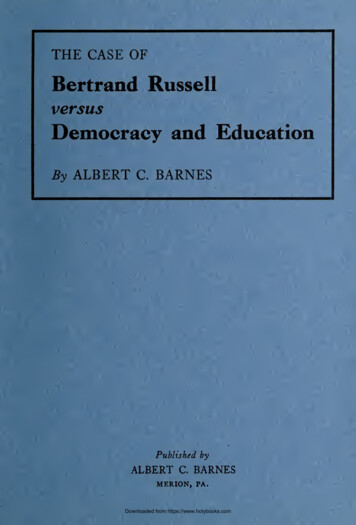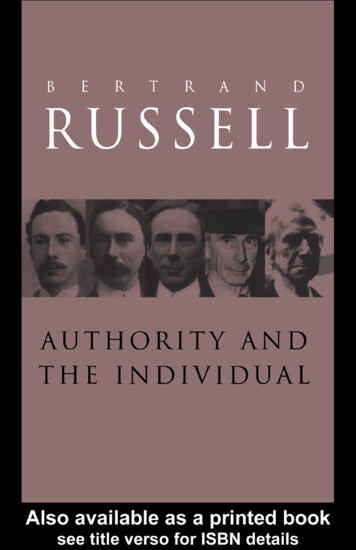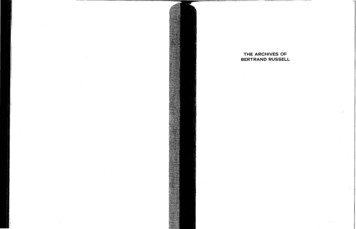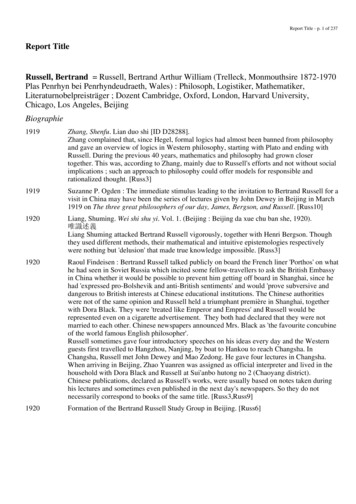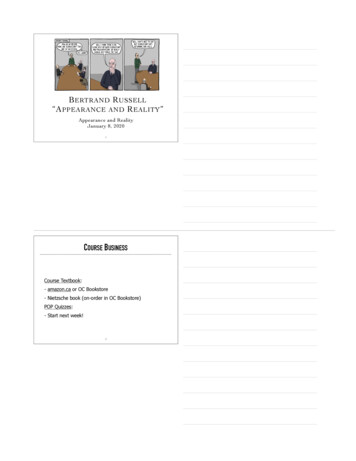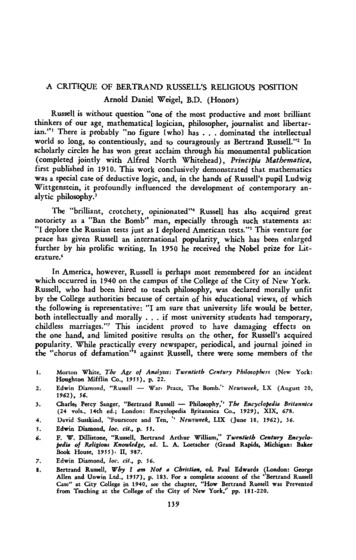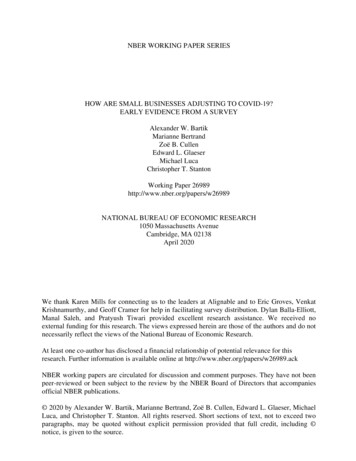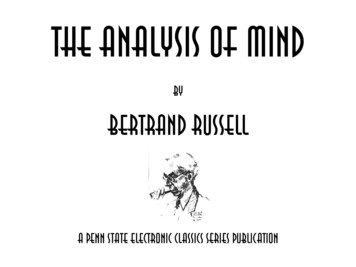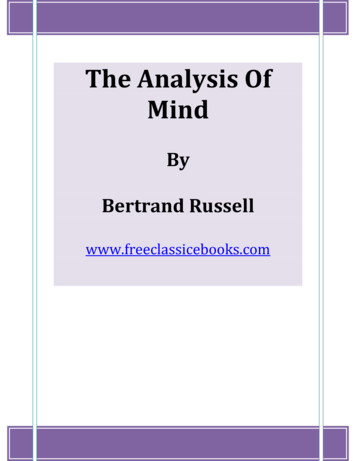
Transcription
www.freeclassicebooks.comThe Analysis OfMindByBertrand Russellwww.freeclassicebooks.com1
www.freeclassicebooks.comContentsMUIRHEAD LIBRARY OF PHILOSOPHY. 3LECTURE I. RECENT CRITICISMS OF "CONSCIOUSNESS" . 6LECTURE II. INSTINCT AND HABIT .26LECTURE III. DESIRE AND FEELING .37LECTURE IV. INFLUENCE OF PAST HISTORY ON PRESENT OCCURRENCES IN LIVING ORGANISMS .49LECTURE V. PSYCHOLOGICAL AND PHYSICAL CAUSAL LAWS .59LECTURE VI. INTROSPECTION.68LECTURE VII. THE DEFINITION OF PERCEPTION .78LECTURE VIII. SENSATIONS AND IMAGES .87LECTURE IX. MEMORY.100LECTURE X. WORDS AND MEANING . 120LECTURE XI. GENERAL IDEAS AND THOUGHT .136LECTURE XII. BELIEF.147LECTURE XIII. TRUTH AND FALSEHOOD . 161LECTURE XIV. EMOTIONS AND WILL .178LECTURE XV. CHARACTERISTICS OF MENTAL PHENOMENA.1832
www.freeclassicebooks.comMUIRHEAD LIBRARY OF PHILOSOPHYAn admirable statement of the aims of the Library of Philosophy wasprovided by the first editor, the late Professor J. H. Muirhead, in hisdescription of the original programme printed in Erdmann's History ofPhilosophy under the date 1890. This was slightly modified in subsequentvolumes to take the form of the following statement:"The Muirhead Library of Philosophy was designed as a contribution to theHistory of Modern Philosophy under the heads: first of Different Schools ofThought--Sensationalist, Realist, Idealist, Intuitivist; secondly of differentSubjects--Psychology, Ethics, Aesthetics, Political Philosophy, Theology.While much had been done in England in tracing the course of evolution innature, history, economics, morals and religion, little had been done intracing the development of thought on these subjects. Yet 'the evolution ofopinion is part of the whole evolution'."By the co-operation of different writers in carrying out this plan it washoped that a thoroughness and completeness of treatment, otherwiseunattainable, might be secured. It was believed also that from writersmainly British and American fuller consideration of English Philosophy thanit had hitherto received might be looked for. In the earlier series of bookscontaining, among others, Bosanquet's "History of Aesthetic," Pfleiderer's"Rational Theology since Kant," Albee's "History of English Utilitarianism,"Bonar's "Philosophy and Political Economy," Brett's "History of Psychology,"Ritchie's "Natural Rights," these objects were to a large extent effected."In the meantime original work of a high order was being produced both inEngland and America by such writers as Bradley, Stout, Bertrand Russell,Baldwin, Urban, Montague, and others, and a new interest in foreign works,German, French and Italian, which had either become classical or wereattracting public attention, had developed. The scope of the Library thusbecame extended into something more international, and it is entering onthe fifth decade of its existence in the hope that it may contribute to thatmutual understanding between countries which is so pressing a need of thepresent time."The need which Professor Muirhead stressed is no less pressing to-day, andfew will deny that philosophy has much to do with enabling us to meet it,although no one, least of all Muirhead himself, would regard that as thesole, or even the main, object of philosophy. As Professor Muirhead3
www.freeclassicebooks.comcontinues to lend the distinction of his name to the Library of Philosophy itseemed not inappropriate to allow him to recall us to these aims in his ownwords. The emphasis on the history of thought also seemed to me verytimely; and the number of important works promised for the Library in thevery near future augur well for the continued fulfilment, in this and otherways, of the expectations of the original editor.H. D. Lewis PREFACEThis book has grown out of an attempt to harmonize two differenttendencies, one in psychology, the other in physics, with both of which I findmyself in sympathy, although at first sight they might seem inconsistent. Onthe one hand, many psychologists, especially those of the behaviouristschool, tend to adopt what is essentially a materialistic position, as a matterof method if not of metaphysics. They make psychology increasinglydependent on physiology and external observation, and tend to think ofmatter as something much more solid and indubitable than mind.Meanwhile the physicists, especially Einstein and other exponents of thetheory of relativity, have been making "matter" less and less material. Theirworld consists of "events," from which "matter" is derived by a logicalconstruction. Whoever reads, for example, Professor Eddington's "Space,Time and Gravitation" (Cambridge University Press, 1920), will see that anold-fashioned materialism can receive no support from modern physics. Ithink that what has permanent value in the outlook of the behaviourists isthe feeling that physics is the most fundamental science at present inexistence. But this position cannot be called materialistic, if, as seems to bethe case, physics does not assume the existence of matter.The view that seems to me to reconcile the materialistic tendency ofpsychology with the anti-materialistic tendency of physics is the view ofWilliam James and the American new realists, according to which the "stuff"of the world is neither mental nor material, but a "neutral stuff," out ofwhich both are constructed. I have endeavoured in this work to develop thisview in some detail as regards the phenomena with which psychology isconcerned.My thanks are due to Professor John B. Watson and to Dr. T. P. Nunn forreading my MSS. at an early stage and helping me with many valuablesuggestions; also to Mr. A. Wohlgemuth for much very useful information asregards important literature. I have also to acknowledge the help of theeditor of this Library of Philosophy, Professor Muirhead, for severalsuggestions by which I have profited.4
www.freeclassicebooks.comThe work has been given in the form of lectures both in London and Peking,and one lecture, that on Desire, has been published in the Athenaeum.There are a few allusions to China in this book, all of which were writtenbefore I had been in China, and are not intended to be taken by the readeras geographically accurate. I have used "China" merely as a synonym for "adistant country," when I wanted illustrations of unfamiliar things.Peking, January 1921.5
www.freeclassicebooks.comTHE ANALYSIS OF MINDLECTURE I. RECENT CRITICISMS OF "CONSCIOUSNESS"There are certain occurrences which we are in the habit of calling "mental."Among these we may take as typical BELIEVING and DESIRING. The exactdefinition of the word "mental" will, I hope, emerge as the lectures proceed;for the present, I shall mean by it whatever occurrences would commonly becalled mental.I wish in these lectures to analyse as fully as I can what it is that reallytakes place when we, e.g. believe or desire. In this first lecture I shall beconcerned to refute a theory which is widely held, and which I formerly heldmyself: the theory that the essence of everything mental is a certain quitepeculiar something called "consciousness," conceived either as a relation toobjects, or as a pervading quality of psychical phenomena.The reasons which I shall give against this theory will be mainly derivedfrom previous authors. There are two sorts of reasons, which will divide mylecture into two parts:(1) Direct reasons, derived from analysis and its difficulties;(2) Indirect reasons, derived from observation of animals (comparativepsychology) and of the insane and hysterical (psycho-analysis).Few things are more firmly established in popular philosophy than thedistinction between mind and matter. Those who are not professionalmetaphysicians are willing to confess that they do not know what mindactually is, or how matter is constituted; but they remain convinced thatthere is an impassable gulf between the two, and that both belong to whatactually exists in the world. Philosophers, on the other hand, havemaintained often that matter is a mere fiction imagined by mind, andsometimes that mind is a mere property of a certain kind of matter. Thosewho maintain that mind is the reality and matter an evil dream are called"idealists"--a word which has a different meaning in philosophy from thatwhich it bears in ordinary life. Those who argue that matter is the realityand mind a mere property of protoplasm are called "materialists." They havebeen rare among philosophers, but common, at certain periods, among menof science. Idealists, materialists, and ordinary mortals have been inagreement on one point: that they knew sufficiently what they meant by thewords "mind" and "matter" to be able to conduct their debate intelligently.6
www.freeclassicebooks.comYet it was just in this point, as to which they were at one, that they seem tome to have been all alike in error.The stuff of which the world of our experience is composed is, in my belief,neither mind nor matter, but something more primitive than either. Bothmind and matter seem to be composite, and the stuff of which they arecompounded lies in a sense between the two, in a sense above them both,like a common ancestor. As regards matter, I have set forth my reasons forthis view on former occasions,* and I shall not now repeat them. But thequestion of mind is more difficult, and it is this question that I propose todiscuss in these lectures. A great deal of what I shall have to say is notoriginal; indeed, much recent work, in various fields, has tended to show thenecessity of such theories as those which I shall be advocating. Accordinglyin this first lecture I shall try to give a brief description of the systems ofideas within which our investigation is to be carried on.* "Our Knowledge of the External World" (Allen & Unwin),and IV. Also "Mysticism and Logic," Essays VIIand VIII.Chapters IIIIf there is one thing that may be said, in the popular estimation, tocharacterize mind, that one thing is "consciousness." We say that we are"conscious" of what we see and hear, of what we remember, and of our ownthoughts and feelings. Most of us believe that tables and chairs are not"conscious." We think that when we sit in a chair, we are aware of sitting init, but it is not aware of being sat in. It cannot for a moment be doubted thatwe are right in believing that there is SOME difference between us and thechair in this respect: so much may be taken as fact, and as a datum for ourinquiry. But as soon as we try to say what exactly the difference is, webecome involved in perplexities. Is "consciousness" ultimate and simple,something to be merely accepted and contemplated? Or is it somethingcomplex, perhaps consisting in our way of behaving in the presence ofobjects, or, alternatively, in the existence in us of things called "ideas,"having a certain relation to objects, though different from them, and onlysymbolically representative of them? Such questions are not easy to answer;but until they are answered we cannot profess to know what we mean bysaying that we are possessed of "consciousness."Before considering modern theories, let us look first at consciousness fromthe standpoint of conventional psychology, since this embodies views whichnaturally occur when we begin to reflect upon the subject. For this purpose,let us as a preliminary consider different ways of being conscious.First, there is the way of PERCEPTION. We "perceive" tables and chairs,7
www.freeclassicebooks.comhorses and dogs, our friends, traffic passing in the street--in short, anythingwhich we recognize through the senses. I leave on one side for the presentthe question whether pure sensation is to be regarded as a form ofconsciousness: what I am speaking of now is perception, where, according toconventional psychology, we go beyond the sensation to the "thing" which itrepresents. When you hear a donkey bray, you not only hear a noise, butrealize that it comes from a donkey. When you see a table, you not only seea coloured surface, but realize that it is hard. The addition of these elementsthat go beyond crude sensation is said to constitute perception. We shallhave more to say about this at a later stage. For the moment, I am merelyconcerned to note that perception of objects is one of the most obviousexamples of what is called "consciousness." We are "conscious" of anythingthat we perceive.We may take next the way of MEMORY. If I set to work to recall what I didthis morning, that is a form of consciousness different from perception,since it is concerned with the past. There are various problems as to how wecan be conscious now of what no longer exists. These will be dealt withincidentally when we come to the analysis of memory.From memory it is an easy step to what are called "ideas"--not in thePlatonic sense, but in that of Locke, Berkeley and Hume, in which they areopposed to "impressions." You may be conscious of a friend either by seeinghim or by "thinking" of him; and by "thought" you can be conscious ofobjects which cannot be seen, such as the human race, or physiology."Thought" in the narrower sense is that form of consciousness whichconsists in "ideas" as opposed to impressions or mere memories.We may end our preliminary catalogue with BELIEF, by which I mean thatway of being conscious which may be either true or false. We say that a manis "conscious of looking a fool," by which we mean that he believes he looksa fool, and is not mistaken in this belief. This is a different form ofconsciousness from any of the earlier ones. It is the form which gives"knowledge" in the strict sense, and also error. It is, at least apparently,more complex than our previous forms of consciousness; though we shallfind that they are not so separable from it as they might appear to be.Besides ways of being conscious there are other things that would ordinarilybe called "mental," such as desire and pleasure and pain. These raiseproblems of their own, which we shall reach in Lecture III. But the hardestproblems are those that arise concerning ways of being "conscious." Theseways, taken together, are called the "cognitive" elements in mind, and it isthese that will occupy us most during the following lectures.8
www.freeclassicebooks.comThere is one element which SEEMS obviously in common among thedifferent ways of being conscious, and that is, that they are all directed toOBJECTS. We are conscious "of" something. The consciousness, it seems, isone thing, and that of which we are conscious is another thing. Unless weare to acquiesce in the view that we can never be conscious of anythingoutside our own minds, we must say that the object of consciousness neednot be mental, though the consciousness must be. (I am speaking within thecircle of conventional doctrines, not expressing my own beliefs.) Thisdirection towards an object is commonly regarded as typical of every form ofcognition, and sometimes of mental life altogether. We may distinguish twodifferent tendencies in traditional psychology. There are those who takemental phenomena naively, just as they would physical phenomena. Thisschool of psychologists tends not to emphasize the object. On the otherhand, there are those whose primary interest is in the apparent fact that wehave KNOWLEDGE, that there is a world surrounding us of which we areaware. These men are interested in the mind because of its relation to theworld, because knowledge, if it is a fact, is a very mysterious one. Theirinterest in psychology is naturally centred in the relation of consciousnessto its object, a problem which, properly, belongs rather to theory ofknowledge. We may take as one of the best and most typical representativesof this school the Austrian psychologist Brentano, whose "Psychology fromthe Empirical Standpoint,"* though published in 1874, is still influential andwas the starting-point of a great deal of interesting work. He says (p. 115):* "Psychologie vom empirischen Standpunkte," vol. i, 1874.second volume was never published.)(The"Every psychical phenomenon is characterized by what the scholastics of theMiddle Ages called the intentional (also the mental) inexistence of an object,and what we, although with not quite unambiguous expressions, would callrelation to a content, direction towards an object (which is not here to beunderstood as a reality), or immanent objectivity. Each contains somethingin itself as an object, though not each in the same way. In presentationsomething is presented, in judgment something is acknowledged or rejected,in love something is loved, in hatred hated, in desire desired, and so on."This intentional inexistence is exclusively peculiar to psychical phenomena.No physical phenomenon shows anything similar. And so we can definepsychical phenomena by saying that they are phenomena whichintentionally contain an object in themselves."The view here expressed, that relation to an object is an ultimate irreducible9
www.freeclassicebooks.comcharacteristic of mental phenomena, is one which I shall be concerned tocombat. Like Brentano, I am interested in psychology, not so much for itsown sake, as for the light that it may throw on the problem of knowledge.Until very lately I believed, as he did, that mental phenomena have essentialreference to objects, except possibly in the case of pleasure and pain. Now Ino longer believe this, even in the case of knowledge. I shall try to make myreasons for this rejection clear as we proceed. It must be evident at firstglance that the analysis of knowledge is rendered more difficult by therejection; but the apparent simplicity of Brentano's view of knowledge will befound, if I am not mistaken, incapable of maintaining itself either against ananalytic scrutiny or against a host of facts in psycho-analysis and animalpsychology. I do not wish to minimize the problems. I will merely observe, inmitigation of our prospective labours, that thinking, however it is to beanalysed, is in itself a delightful occupation, and that there is no enemy tothinking so deadly as a false simplicity. Travelling, whether in the mental orthe physical world, is a joy, and it is good to know that, in the mental worldat least, there are vast countries still very imperfectly explored.The view expressed by Brentano has been held very generally, and developedby many writers. Among these we may take as an example his Austriansuccessor Meinong.* According to him there are three elements involved inthe thought of an object. These three he calls the act, the content and theobject. The act is the same in any two cases of the same kind ofconsciousness; for instance, if I think of Smith or think of Brown, the act ofthinking, in itself, is exactly similar on both occasions. But the content ofmy thought, the particular event that is happening in my mind, is differentwhen I think of Smith and when I think of Brown. The content, Meinongargues, must not be confounded with the object, since the content mustexist in my mind at the moment when I have the thought, whereas theobject need not do so. The object may be something past or future; it may bephysical, not mental; it may be something abstract, like equality forexample; it may be something imaginary, like a golden mountain; or it mayeven be something self-contradictory, like a round square. But in all thesecases, so he contends, the content exists when the thought exists, and iswhat distinguishes it, as an occurrence, from other thoughts.* See, e.g. his article: "Ueber Gegenstande hoherer Ordnungundderen Verhaltniss zur inneren Wahrnehmung," "ZeitschriftfurPsychologie and Physiologie der Sinnesorgane," vol. xxi,pp. 182-272(1899), especially pp. 185-8.To make this theory concrete, let us suppose that you are thinking of St.Paul's. Then, according to Meinong, we have to distinguish three elements10
www.freeclassicebooks.comwhich are necessarily combined in constituting the one thought. First, thereis the act of thinking, which would be just the same whatever you werethinking about. Then there is what makes the character of the thought ascontrasted with other thoughts; this is the content. And finally there is St.Paul's, which is the object of your thought. There must be a differencebetween the content of a thought and what it is about, since the thought ishere and now, whereas what it is about may not be; hence it is clear that thethought is not identical with St. Paul's. This seems to show that we mustdistinguish between content and object. But if Meinong is right, there can beno thought without an object: the connection of the two is essential. Theobject might exist without the thought, but not the thought without theobject: the three elements of act, content and object are all required toconstitute the one single occurrence called "thinking of St. Paul's."The above analysis of a thought, though I believe it to be mistaken, is veryuseful as affording a schema in terms of which other theories can be stated.In the remainder of the present lecture I shall state in outline the view whichI advocate, and show how various other views out of which mine has grownresult from modifications of the threefold analysis into act, content andobject.The first criticism I have to make is that the ACT seems unnecessary andfictitious. The occurrence of the content of a thought constitutes theoccurrence of the thought. Empirically, I cannot discover anythingcorresponding to the supposed act; and theoretically I cannot see that it isindispensable. We say: "I think so-and-so," and this word "I" suggests thatthinking is the act of a person. Meinong's "act" is the ghost of the subject, orwhat once was the full-blooded soul. It is supposed that thoughts cannotjust come and go, but need a person to think them. Now, of course it is truethat thoughts can be collected into bundles, so that one bundle is mythoughts, another is your thoughts, and a third is the thoughts of Mr.Jones. But I think the person is not an ingredient in the single thought: heis rather constituted by relations of the thoughts to each other and to thebody. This is a large question, which need not, in its entirety, concern us atpresent. All that I am concerned with for the moment is that thegrammatical forms "I think," "you think," and "Mr. Jones thinks," aremisleading if regarded as indicating an analysis of a single thought. It wouldbe better to say "it thinks in me," like "it rains here"; or better still, "there isa thought in me." This is simply on the ground that what Meinong calls theact in thinking is not empirically discoverable, or logically deducible fromwhat we can observe.The next point of criticism concerns the relation of content and object. The11
www.freeclassicebooks.comreference of thoughts to objects is not, I believe, the simple direct essentialthing that Brentano and Meinong represent it as being. It seems to me to bederivative, and to consist largely in BELIEFS: beliefs that what constitutesthe thought is connected with various other elements which together makeup the object. You have, say, an image of St. Paul's, or merely the word "St.Paul's" in your head. You believe, however vaguely and dimly, that this isconnected with what you would see if you went to St. Paul's, or what youwould feel if you touched its walls; it is further connected with what otherpeople see and feel, with services and the Dean and Chapter and SirChristopher Wren. These things are not mere thoughts of yours, but yourthought stands in a relation to them of which you are more or less aware.The awareness of this relation is a further thought, and constitutes yourfeeling that the original thought had an "object." But in pure imaginationyou can get very similar thoughts without these accompanying beliefs; andin this case your thoughts do not have objects or seem to have them. Thusin such instances you have content without object. On the other hand, inseeing or hearing it would be less misleading to say that you have objectwithout content, since what you see or hear is actually part of the physicalworld, though not matter in the sense of physics. Thus the whole question ofthe relation of mental occurrences to objects grows very complicated, andcannot be settled by regarding reference to objects as of the essence ofthoughts. All the above remarks are merely preliminary, and will beexpanded later.Speaking in popular and unphilosophical terms, we may say that thecontent of a thought is supposed to be something in your head when youthink the thought, while the object is usually something in the outer world.It is held that knowledge of the outer world is constituted by the relation tothe object, while the fact that knowledge is different from what it knows isdue to the fact that knowledge comes by way of contents. We can begin tostate the difference between realism and idealism in terms of this oppositionof contents and objects. Speaking quite roughly and approximately, we maysay that idealism tends to suppress the object, while realism tends tosuppress the content. Idealism, accordingly, says that nothing can beknown except thoughts, and all the reality that we know is mental; whilerealism maintains that we know objects directly, in sensation certainly, andperhaps also in memory and thought. Idealism does not say that nothingcan be known beyond the present thought, but it maintains that the contextof vague belief, which we spoke of in connection with the thought of St.Paul's, only takes you to other thoughts, never to anything radically differentfrom thoughts. The difficulty of this view is in regard to sensation, where itseems as if we came into direct contact with the outer world. But theBerkeleian way of meeting this difficulty is so familiar that I need not12
www.freeclassicebooks.comenlarge upon it now. I shall return to it in a later lecture, and will onlyobserve, for the present, that there seem to me no valid grounds forregarding what we see and hear as not part of the physical world.Realists, on the other hand, as a rule, suppress the content, and maintainthat a thought consists either of act and object alone, or of object alone. Ihave been in the past a realist, and I remain a realist as regards sensation,but not as regards memory or thought. I will try to explain what seem to meto be the reasons for and against various kinds of realism.Modern idealism professes to be by no means confined to the presentthought or the present thinker in regard to its knowledge; indeed, itcontends that the world is so organic, so dove-tailed, that from any oneportion the whole can be inferred, as the complete skeleton of an extinctanimal can be inferred from one bone. But the logic by which this supposedorganic nature of the world is nominally demonstrated appears to realists,as it does to me, to be faulty. They argue that, if we cannot know thephysical world directly, we cannot really know any thing outside our ownminds: the rest of the world may be merely our dream. This is a dreary view,and they there fore seek ways of escaping from it. Accordingly they maintainthat in knowledge we are in direct contact with objects, which may be, andusually are, outside our own minds. No doubt they are prompted to thisview, in the first place, by bias, namely, by the desire to think that they canknow of the existence of a world outside themselves. But we have toconsider, not what led them to desire the view, but whether their argumentsfor it are valid.There are two different kinds of realism, according as we make a thoughtconsist of act and object, or of object alone. Their difficulties are different,but neither seems tenable all through. Take, for the sake of definiteness, theremembering of a past event. The remembering occurs now, and is thereforenecessarily not identical with the past event. So long as we retain the act,this need cause no difficulty. The act of remembering occurs now, and hason this view a certain essential relation to the past event which itremembers. There is no LOGICAL objection to this theory, but there is theobjection, which we spoke of earlier, that the act seems mythical, and is notto be found by observation. If, on the other hand, we try to constitutememory without the act, we are driven to a content, since we must havesomething that happens NOW, as opposed to the event which happened inthe past. Thus, when we reject the act, which I think we must, we are drivento a theory of memory which is more akin to idealism. These arguments,however, do not apply to sensation. It is especially sensation, I think, whichis considered by those realists who retain only the object.* The
it had hitherto received might be looked for. In the earlier series of books containing, among others, Bosanquet's "History of Aesthetic," Pfleiderer's "Rational Theology since Kant," Albee's "History of English Utilitarianism," Bonar's
